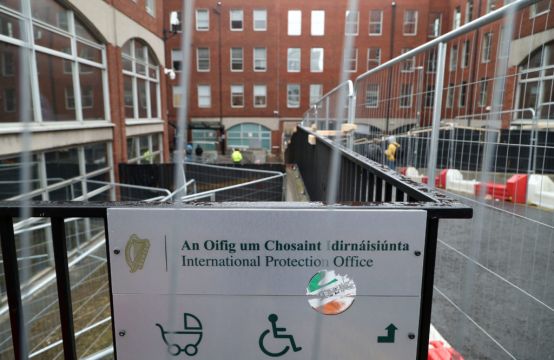Public health inspectors visiting the Mount Street encampment of asylum seekers in Dublin heard that rats had been running around in daylight, saw street drains blocked with soiled toilet paper, and warned of a substantial risk of infectious disease spread.
The HSE health protection team said that asylum applicants living there had no choice but to use the streets as toilets during the night while seagulls and other birds rummaged through food waste at the site.
The HSE staff could not even tell how many people were living there, at first believing there were 200 but later discovering there were 273 when the encampment was dismantled.
When the inspection took place in late April, the public health staff saw “open defecation, faeces, including diarrhoea … and urination”.
Drains were found to be blocked with soiled toilet paper and rubbish was evident all around the encampment.
The public health report, which was released under Freedom of Information laws, said: “[Department of Justice] staff had witnessed rodents at the site, even during the day. Rodents (and birds), as vectors of disease, further add to risk.”
It said trying to clean the site with power hoses was challenging because of the tightly packed tents and the risk of spreading contamination further.
Concerns were also raised that there could be drug waste on the site – including dirty needles – that had the potential to spread “blood-borne viruses”.
The report said even the most basic public health standards, which included access to fresh water, sanitation services, and proper waste collection were not in place.
It added: “The physical, psychosocial and emotional pressures caused by a lack of security and poor shelter compound the stresses experienced by these people, significantly undermining their health and well-being, and ability to recover.”
It said that the encampment represented a public health risk not just to those living in the tents, but also to people living and working in the vicinity.
The report said tents were generally small with “larger heavy-duty tarpaulins” providing extra cover above them.
The inspection said: “We did not enter any of the tents. The tents are, in the main, in close proximity to each other with little or no room between them.”
It said conditions there meant people were left without “privacy and human dignity” and that there was no special security in place, although Garda patrols had become more frequent.
The report added: “It is evident that … minimum standards have not been achieved in this setting.”
Inspectors said that those living there “urgently require” alternative acceptable accommodation that met public health standards.
They said in the immediate short term that emergency steps should be taken to provide toilet and hand washing facilities.
It said the international protection applicants should be given alcohol hand sanitiser and that drainage and unblocking services needed to take place much more often.
“The risk of fire, due to tents in close proximity to each other, should be considered by local authorities,” a list of recommendations said.
The public health inspectors also said a registration system for those living there was needed in case there was an “infectious disease outbreak” and people needed to be traced.
The tent village was eventually removed in May. However, many of the residents moved instead to locations along the nearby Grand Canal where similar public health issues were reported before that camp, too, was cleared.
The Department of Justice, which released the report, said the well-being of asylum applicants had been of “paramount concern” in their decisions around their relocation.







